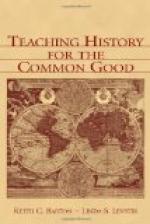Special reports
The class having taken their seats, the next order of business should be the reports on special topics assigned for the purpose of making the period of history under discussion more interesting and vital. As has been said, these reports should not be read, but delivered by the pupil facing the class. The class should be encouraged to ask questions on the report when finished and the student responsible for the report should be expected to answer any reasonable inquiry. If other students are able to contribute to the topics reported on, they should be encouraged to do so. Let the teacher be sure that he has sounded the depths of the students’ information and curiosity before he himself discusses the report. If the device of reports delivered in class is to justify itself, the matter contained in them must be so arranged and discussed that the whole class receives real benefit. The ingenious teacher will be able to establish a tradition in his course for a careful preparation and critical discussion of these reports. The rivalry of students for excellence in this work is not difficult to stimulate. A premium should be put on criticism which finds mentioned in the characterization qualities inconsistent with the facts recorded in the text, or omissions which the facts of the text seem to justify.
Fundamental principles of good questioning
It is not likely that the teacher will find it advisable to require reports at every recitation nor that the reports and their discussion will consume, at the most, longer than ten or fifteen minutes of any class period. There must always be time for direct oral questioning on the facts of the lesson; questioning that will test the student’s memory, ability to analyze, and powers of expression. Certain principles are fundamental to good questioning in any recitation.
1. The questions should be brief.
2. They should
be prepared by the teacher before coming to
recitation.
This will insure rapidity. A vast deal of time
is
lost
by the unfortunate habit possessed by many teachers
of
never
having the next question ready to use.
3. They should precede the name of the pupil required to answer it.
4. They should
not be leading questions to which the pupil can
guess
the answers.
5. They should
be grammatically stated with but one possible
interpretation.
6. Except for purposes
of rapid review they should not be
answerable
with yes or no.
7. They should
be asked in a voice loud enough to be heard by all
the
class, and only once.
8. They should
be asked in no regular order, but nevertheless in
such
a way that every member of the class will have a chance
to
recite.
Some additional suggestions for teachers of history




